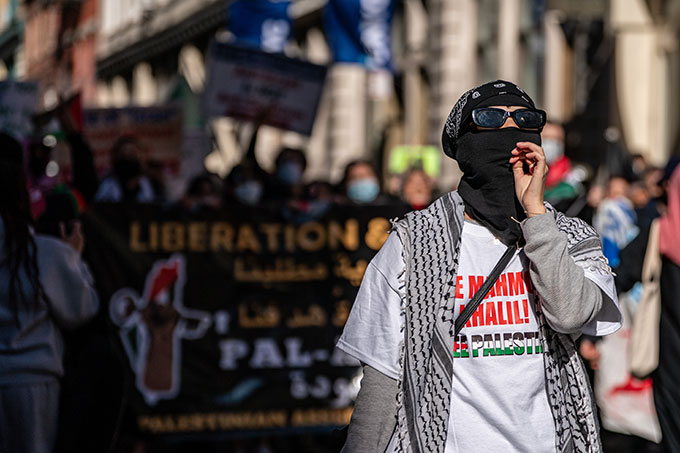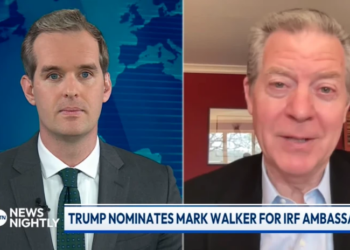For noncitizens, residing in the United States is a coveted privilege, not a right. Progressives, however, have lost sight of this principle of immigration law—at least as applied to a zealous supporter of Hamas.
Former Columbia graduate student Mahmoud Khalil is the first target of the Trump administration’s effort to crack down on law-breaking Hamas supporters on college campuses. The Syrian-born green-card recipient served as one of the ringleaders of the post-October 7 riots at his former university and functioned as the lead “negotiator” for the student group known as Columbia United Apartheid Divest (CUAD). CUAD was one of the primary agents of chaos on Columbia’s campus during last spring’s “encampment,” during which rioters smashed windows, defaced and occupied buildings, disrupted classes, and harassed and threatened Jewish students. Interestingly, recent court filings show that Khalil received his green cards just five months ago—long after he and CUAD wreaked havoc (and just eleven days after President Trump’s electoral win).
CUAD’s words are as anarchistic as its actions. The organization has identified itself as “fighting for the total eradication of Western civilization” and requested “instruction from militants in the Global South.” It insisted that members must “continue to escalate until the empire crumbles,” cited a violent takeover of a prison in Bangladesh by Islamists as a model of escalation, and noted that CUAD was inspired by the “Palestinian resistance”—that is, Hamas and other foreign terrorist organizations. The group has celebrated acts by domestic terrorists, including the attempted firebombing of a federal building in Oakland, California, by serial arsonist Casey Goonan, and threatened to shut down Columbia University.
Despite his defenders’ claims, Khalil’s alleged activities make his deportation perfectly legal—and reasonable—under federal law. Doing so is consistent with what the Supreme Court has called the government’s “power of self-preservation” against those who seek its destruction, as Khalil’s organization has so readily advocated.
Under U.S. immigration law, noncitizens or “aliens”—including green-card holders like Khalil—are expected to meet a certain standard of behavior set forth by the Immigration and Nationality Act (INA). Failure to do so renders them “deportable aliens” under 8 U.S.C. § 1227.
A range of bad acts might render a noncitizen deportable, including marriage fraud, voter fraud, certain firearm offenses, or domestic violence. Relevant to Khalil’s case, U.S. law stipulates that an alien is deportable if he “endorses or espouses terrorist activity or persuades others to endorse or espouse terrorist activity or support a terrorist organization.” Additionally, the Secretary of State can seek the deportation an alien if the Secretary “has reasonable ground to believe [that the presence or activities of an alien] would have potentially serious adverse foreign policy consequences for the United States.”

Crucially, “support” for a terrorist organization need not be monetary to constitute grounds for deportation or denial of entry. Publicly supporting a terrorist organization in a capacity ordinarily described as “speech” may still render an alien deportable.
Contrary to the claims of the left and the media, such restraints do not run afoul of First Amendment case law. The Supreme Court has long held that some classes of individuals—including students, prisoners, members of the Armed Forces, and foreigners—may be subjected to certain restrictions on their speech. The Court unequivocally declared in Turner v. Williams that some views may be “so dangerous to the public weal that aliens who hold and advocate them would be undesirable additions to our population.” Governments, the Court continued, “cannot be denied the power of self-preservation,” and thus they have the right to deport individuals, like Khalil, who support foreign terrorist organizations and the destruction of Western civilization.
Consistent with this precedent, lower courts routinely uphold deportations or denials of entry based on an alien’s public support for a terrorist group. In 2018, for example, the Sixth Circuit upheld a decision by immigration courts denying entry to an alien who had copied and distributed flyers on behalf of two Iranian terrorist organizations. The court made clear that U.S. immigration law contains no “carveout” for independent political advocacy on behalf of terrorist organizations. Similarly, in 2014, the Ninth Circuit upheld an immigration court finding that an alien had provided support to Mojahedin-e Khalq—later designated a Foreign Terrorist Organization—after he had produced flyers and written articles in support of the group and provided weapons training to its members. It did not matter that at the time of the alien’s support, the group had not yet been designated.
The Department of Homeland Security alleges that Khalil, in similar fashion, distributed pro-Hamas flyers on Columbia University’s campus bearing the Hamas insignia, materials purportedly originating from Hamas’s own media arm. It’s worth noting that unlike in the above Ninth Circuit decision, Hamas was designated a Foreign Terrorist Organization by the State Department in 1997, well before Khalil’s activities. If substantiated, that allegation presents clear grounds for removal. Furthermore, Secretary of State Marco Rubio was reportedly presented with intelligence concluding that Khalil poses a national security threat to the United States, which would provide yet another basis for removal under the INA.
Appeals to Khalil’s free speech rights are meritless. A green card is not synonymous with citizenship, though many seem to believe otherwise. Indeed, the federal government has the power to revoke a green card at any time, consistent with its statutory authority and assuming due process.
Despite the unfounded outrage, Khalil’s deportation is an instance of America exercising the right to protect itself against foreign threats—precisely as it should.
Top Photo by Selcuk Acar/Anadolu via Getty Images
City Journal is a publication of the Manhattan Institute for Policy Research (MI), a leading free-market think tank. Are you interested in supporting the magazine? As a 501(c)(3) nonprofit, donations in support of MI and City Journal are fully tax-deductible as provided by law (EIN #13-2912529).
















